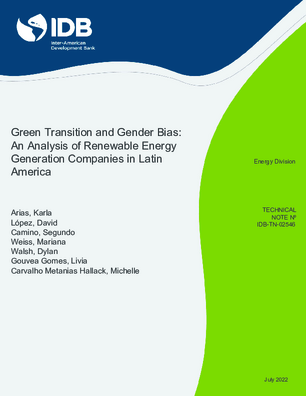Green Transition and Gender Bias: An Analysis of Renewable Energy Generation Companies in Latin America
Date issued
Sep 2022
Subject
Women;
Renewable Energy;
Gender;
Labor Force;
STEM Education;
Energy Transition;
Labor;
Industry;
Energy;
Gender Gap;
Labor Market;
Female Labor Force;
Female Employment
JEL code
J16 - Economics of Gender • Non-labor Discrimination;
O33 - Technological Change: Choices and Consequences • Diffusion Processes;
Q42 - Alternative Energy Sources;
E24 - Employment • Unemployment • Wages • Intergenerational Income Distribution • Aggregate Human Capital • Aggregate Labor Productivity
Country
Bolivia;
Chile;
Costa Rica;
Panama;
Mexico;
Uruguay
Category
Technical Notes
This study analyzes how the energy transition might change gender bias in power-generating industries. To this end, this paper employs a sample of 102 renewable energy generation companies from six countries in Latin America and the Caribbean: Bolivia, Chile, Costa Rica, Panama, Mexico, and Uruguay. The analysis of collected data shows that renewable generation companies with the highest relative efficiency in the labor-capital ratio are those with the highest participation of women. In addition, the results show that renewable companies are incrementing recruitment of women in energy generation. Nevertheless, in the analyzed sample, the participation of women in renewables is still lower than the sectorial average. Moreover, there is no structural change with respect to roles that women occupy, when comparing renewables companies with others generation companies. Considering the companies size, bigger renewables companies (with higher installed generation capacity) tend to hire more women, but those women occupy mostly non-technical positions. In addition, women's participation decreases in positions requiring more technical occupations. Women represent 36% of STEM1 employees, 39% of non-STEM employees, and 48% of non-qualified employees of the renewable generation companies surveyed. Concerning the role of women in decision making roles within energy companies, wide gender gaps exist in executive and management positions; the proportion of females in the boardroom and in management roles for renewables generation companies was 24% and 22%, respectively. Furthermore, 68% of surveyed companies did not have a gender policy in place. This study confirms that a change in technology alone does not generate qualitative changes in the labor market from a gender perspective. Such changes would be achieved by complementing technological change with inclusion policies, encouraging women to study careers related to science and technology to fill the shortage of female professionals in these areas, and closing the knowledge gap through systematic data collection and sharing about gender in the energy workforce.



